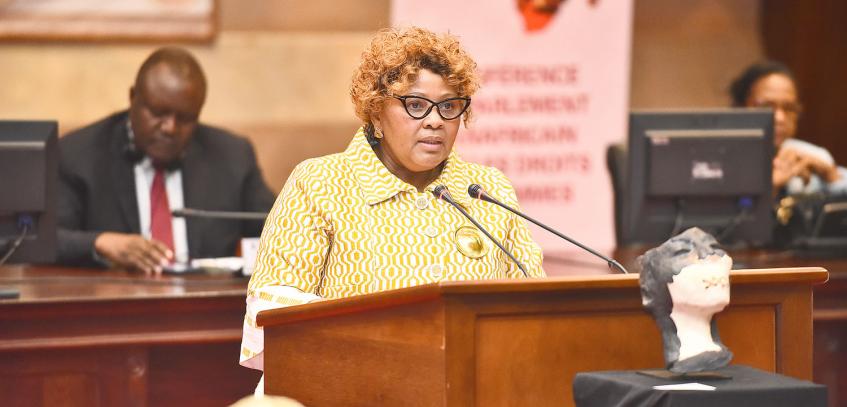Much progress has been made by the African continent, not only to reverse the impact of gender inequality but also to prepare itself to benefit from the advantage of increased participation of Women in leadership and in the Economy, said Guest of Honour, Rt. Hon. Nosiviwe Noluthando Mapisa-Nqakula, Speaker of the Republic of South Africa National Assembly at the 13th Conference on Women’s Rights held in Midrand, South Africa.
Hosted by the Pan-African Parliament (PAP) Women’s Caucus, the conference is held on the sidelines of the currently underway First Ordinary Session of the Sixth Parliament of the PAP, under the theme: “Women empowerment and inclusion in governance”.
The conference seeks to tackle issues affecting women across the continent and afford a platform to interrogate the role of women in governance. It also aims to unpack issues about women in decision-making positions and the role of women legislators in addressing the existing gaps between policy frameworks on women’s rights and the actual realities of African women.
“Over the years since the establishment of the African Union (AU), our continent has shown commitment to promoting gender equality and the empowerment of women,” said Rt. Hon. Mapisa-Nqakula.
“From laying the necessary legal framework and instruments, to our own declaration of 2010 to 2020 as the African Women’s Decade, mother Africa has shown great strides both in addressing the plight of women and growing representation and involvement in decision making. Nearly all of the members of the AU and by extension this Parliament, have now ratified the Convention on the Elimination of All Forms of Discrimination Against Women, while more than half have ratified the African Union’s Protocol on the Rights of Women in Africa. In this regard, as far as a demonstration of real commitment, Africa’s leaders are not doing very bad, in fact, we compare favorably against many other continents in this regard.”
Rt. Hon. Mapisa-Nqakula also mentioned that the women’s conference sits at an opportune moment, at a time when the world is grappling with reorganising itself to respond to the wide-ranging socio-economic impact of the Covid-19 pandemic.
“The post-Covid-19 Recovery is not going to be about some isolated pockets of interventions to return the world to normality and reignite economic growth, but a total re-imagination of our society as we know it. A New World Order.
“For far too long, our continent’s women and girls have suffered the twin challenges of women's oppression and poverty, in a continent that has so much potential to harness for qualitative economic and social development for all. In fact, the very exclusion of women and the skewed development focus on young girls is the reason why our own ability to harness such potential remains limited,” she said.
Furthermore, she underscored that in the context of opportunities brought about by the post-Covid-19 Recovery and the 4th industrial revolution, the biggest threat to Africa harnessing such potential will be gender inequality.
She also noted that more needs to be done to improve the lives of women.
“Despite this, however, the quality of life amongst many Africans, especially women have not improved for the better. Women continue to struggle to break into any jobs, and when they do the majority is still employed as low-skill labour, in an unsupported informal market and under dangerous and unsafe conditions. The wage gaps for paid work between men and women continue to widen.”
“It is important therefore that Africa, and the global community, moves beyond just demonstrating commitment, and take measurable actions to rid ourselves of all barriers to women's and girls’ participation in the socio-economic development of their nations and the continent.
“In addition, it is also going to be important that women are involved in structures of decision making, including in leadership if women's issues are to be prioritized in both national and continental development agendas,” added Rt. Hon. Mapisa-Nqakula.
Rt. Hon. Mapisa-Nqakula also called for a more empowered PAP.
“In this regard, the roles of Parliaments become very important, as the duty to ensure accountability for our plan rests. Without a strong system of oversight and accountability, all the plans, commitments and treaties will remain pipe dreams that will never be realized. In the absence of strong activist Parliaments, including a more empowered PAP, we run the risk of failing future generations and plans and goals such as the SGDs and Agenda 2063 will never be realised.”
Meanwhile, the Speaker also disclosed that while in Kigali, Rwanda during the 145th Assembly of the Inter-Parliamentary Union (IPU) Women Speakers of the Africa Geopolitical group, a Women Speakers Consultative Forum (WSCF) was established. WSCF is a structure that will coordinate different African Parliament's positions on gender mainstreaming in all IPU activities.
“We believe that this platform can be very instrumental in influencing and shaping gender-sensitive policies in the Continent as well, including within the PAP. The Speaker of the Zambian Parliament, Hon Nelly Butete Kashumba was elected as the inaugural Chairperson of the Africa Geopolitical Group of Women Speakers,” she said.
-Ends-








